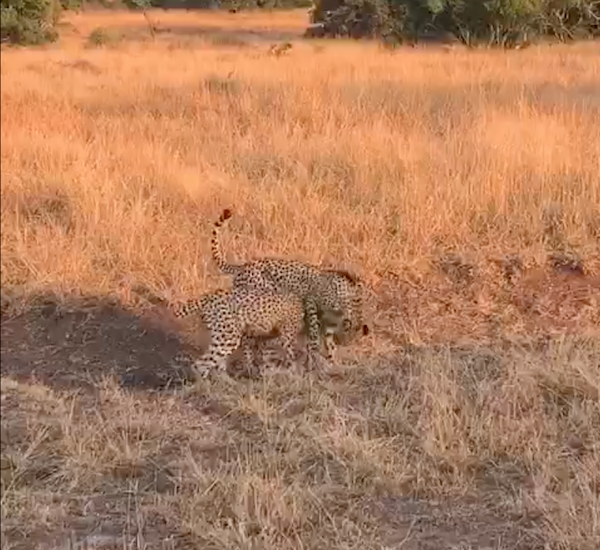- June 26, 2019
- Posted by: David Marshall
- Category: Innovation, Management

Take a look at this video. It’s of a mother cheetah and her cub that I took while I was on a safari in Natal, South Africa. I used to own a company in South Africa in the 70s, and I like to return to South Africa from time to time to visit old friends.
This time, I took my family with me, and we all went on safari at the Phinda reserve where I managed to shoot that video. Phinda is a reserve that’s owned and financed by a nonprofit organization called Beyond. They have reserves like this all over the world, and it’s funded in part by the Getty Foundation.
Pay close attention to the cub’s tail. Or rather, a lack of a tail — it was either diseased or even bitten off by another predator. The cub’s missing tail is going to cause him a lot of problems when he gets older and leaves his mother. (Actually, the mother will leave him, but I won’t split hairs.)
The reason he’s going to have problems is that a cheetah’s tail acts as its rudder. Any cat, especially a cheetah, has to be able to change direction very quickly when it runs. For example, an antelope will jig back and forth to get away from predators, and the cheetah will actually shift its tail to change direction and follow the antelope. (Watch the video below to see how and why a cheetah is so fast, and why it needs a tail.)
Without the tail, or even with a very short tail, the cub will not be able to hunt effectively when he’s fully grown. He’s going to need a partner to hunt with, a partner who will look out for him and let him share in the meals.
The gamekeepers at Phinda — the game reserve in Natal — said they’ll keep an eye on our young cub and see whether or not he teams up with someone else so he can feed. If not, they’ll have to figure out how to provide for him.
What does a tail-less cheetah have to do with business?
(No, this is not a lesson about “cheetahs never prosper.”)
When I saw the cub, my first thought was “well, nobody’s perfect.” And when I learned what he will need to do to survive, it reminded me of the important business relationships I’ve had over the years, and how I’ve depended on my partners and they’ve depended on me for our mutual survival.
We all have our shortcomings (sorry!) and we all have our strengths and weaknesses. No one can do anything by themselves. And in business, you always need people (staff, vendors, advisors, consultants) who can help you overcome your shortcomings.
Because if you don’t, you don’t eat.
This is the problem many entrepreneurs, and even many executives, have. They think they can, or they have to, do everything themselves. That they have to know how to perform all functions of their business better than anyone else. This is not actually the case — no one expects you to be a master of all trades.
You need people around you who can do what you can’t. There are certain tasks you are responsible for, but you just can’t do. In my case, it’s technology and computers; I’m terrible with computer systems and networks, and implementing enterprise software. Instead, I find people who have those capabilities, and I turn them loose and get out of their way.
In that sense, they are my “hunting partner.” They keep me headed in the right direction and let me make those sudden turns so we can all get what we’re chasing, and we all get a chance to eat. I’m able to do the same for them. I can help them with processes, measurement, and making the leadership decisions necessary to steer the bigger ship in the right direction, and they handle the things that keep the ship running.
Special note: I also managed to get a video of a female lion walking past our Jeep. I wasn’t too worried, because our gamekeeper told us that for her to attack, we would have to do something to provoke or threaten her, and/or she had to recognize us as food. It doesn’t have anything to do with the lesson above; I just thought you’d like to see it.
I’ve been a manufacturing executive, as well as a sales and marketing professional, for a few decades. Now I help companies turn around their own business, learning lessons from unlikely places like tail-less cheetahs. If you would like more information, please visit my website and connect with me on Twitter, Facebook, or LinkedIn.

